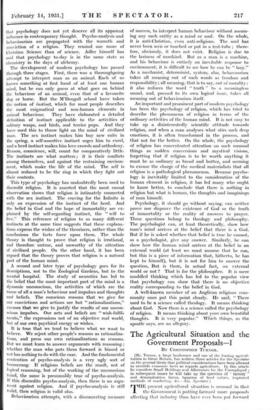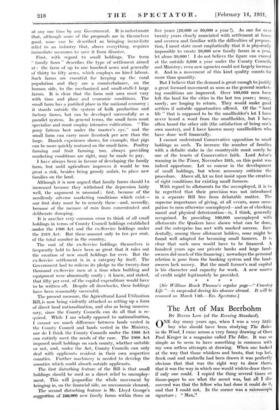The Agricultural Situation and the Government Proposals—I
BY CHRISTOPHER TURNOR.
[Mr. Tumor, a large landowner and one of the leading agricul- turists in Great Britain, has written three articles for the Spectator on the general thesis that political considerations have been allowed to override economic facts as regards agriculture. In this article he considers Small Holdings and Allotments for the Unemployed ; in subsequent issues he will take up.the question of " factory " and demonstration farms, taxation of land -values, improved methods of marketing, &c.—ED. Spectator.] present agricultural situation is. unusual in that the Government is putting forward more proposals affecting that industry than have ever been put forward at any one time by any Government. It is unfortunate that, although some of the proposals are in themselves good, none can be described as bringing immediate relief to an industry that, above everything, requires immediate measures to save it from disaster.
First, with regard to small holdings. The term " family farm " describes the type of settlement aimed at : the farm of up to one hundred acres and generally of thirty to fifty acres, which employs no hired labour. Such farms are essential for keeping up the rural population and they are a counterbalance, on the human side, to the mechanized and small-staffed large farms. It is clear that the farm unit area must vary with time and place and economic conditions. The small farm has a justified place in the national economy ; it stands outside the system of bulk production and factory farms, but can be developed successfully as a parallel system. In general terms, the small farm must specialize and must employ intensive cultivation. " The pony fattens best under the master's eye," and the small farm can carry more livestock per acre than the large. Danish experience shows, for example, that pigs can be more quickly matured on the small farm. Poultry farming and fruit farming, too, always providing marketing conditions are right, may be made to pay.
I have always been in favour of developing the family farm, but until agriculture improves it would be too great a risk, besides being grossly unfair, to place new families on the land.
Although it is now argued that family farms should l e increased because they withstood the depression fairly well, the argument is unsound ; first, because of the needlessly adverse marketing conditions which exist— our first duty must be to remedy these—and, secondly, because of the menace of ruin from concentrated and deliberate dumping.
It is another very common error to think of all small holdings in terms of County Council holdings established under the 1908 Act and the ex-Service holdings under the 1919 Act. But these amount only to ten per cent. of the total number in the country.
The cost of the ex-Service holdings themselves is frequently held to have been so great that it rules out the creation of new small holdings for ever. But the ex-Service settlement is in a category by itself. The Government had to redeem its pledge to the twenty-four thousand ex-Service men at a time when building and equipment were abnormally costly ; it knew, and stated, that fifty per cent. of the capital expenditure would have to be written off. Despite all drawbacks, these holdings have been reasonably successful.
The present measure, the Agricultural Land Utilization Bill, is now being violently attacked as setting up a form of direct land nationalization, and also as being unneces- sary, since the County Councils can do all that is re- quired. While I am wholly opposed to nationalization, I cannot see much difference between lands vested in the County Council and lands vested in the Ministry, nor do I think the County Councils under the 1908 Act can entirely meet the needs of the case. The 1908 Act imposed small holdings on each county, whether suitable or not, and, under the Act, County Councils can only deal with applicants resident in their own respective counties. Further machinery is needed to develop the counties which could absorb outside applicants.
The first disturbing feature of the Bill is that small holdings should be used as a direct relief to unemploy- ment. This will jeopardize the whole movement by bringing in, on the financial side, an uneconomic element.
The second disturbing feature is Mr. Lloyd. George's suggestion of 100/060 new family farms within three or five years (20,000 or 30,000 a year !). As one for over twenty years closely associated with settlement at home and oversea and familiar with the difficulties of prepara- tion, I must state most emphatically that it is physically impossible to create 20,000 new family farms in a year, let alone 30,000 ! I do not believe the figure can exceed at the outside 3,000 a year under the County Councils and Ministry; even new agencies could not largely increase it. And in a movement of this kind quality counts for more than quantity.
But I believe that the demand is great enough to.justify a great forward movement as soon as the general market. ing conditions are improved. Over 100,000 men have left the land for the cities in the last ten years ; many, surely, are longing to return. They would make good settlers if suitable opportunities offered. Of the " hard life " that is supposed to be the smallholder's lot I have never heard a word from the smallholder, but I have often heard the other side (the satisfaction of being one's own master), and I have known many smallholders who have done well financially.
I cannot understand Conservative opposition to small holdings as such. To increase the number of families with a definite stake in the countryside must surely be one of the tenets of Conservative faith. Lord Astor's warning in the Times, November 26th, on this point was indeed opportune. Let us concur in the development of small holdings, but where necessary criticize the procedure. Above all, let us first insist upon the creation of right conditions for existing small farmers.
With regard to allotments for the unemployed, it is to be regretted that their provision was not introduced in a separate Bill free from debatable matter. The supreme importance of giving, at all events, some occu- pation to men otherwise unemployed—and so of checking moral and physical deterioration—is, I think, generally recognized. In providing 100,000 unemployed with allotments the Quakers have shown what can be done, and the enterprise has met with marked success. Inci- dentally, among these allotment holders, some might be found well adapted for becoming small farmers. It is clear that such men would have to be financed. A hundred years ago our private banks and large land- owners did much of this financing ; nowadays the personal relation is gone from the banking system and the land- owners lack money. But the small farmer's real capital is his character and capacity for work. A new source of credit might legitimately be provided.
[Sir lfilliant Beach Thomas's regular page—r" Country Life "—is suspended during his absence abroad. It will be resumed on March 14th.—En. Spectator.]
















































 Previous page
Previous page